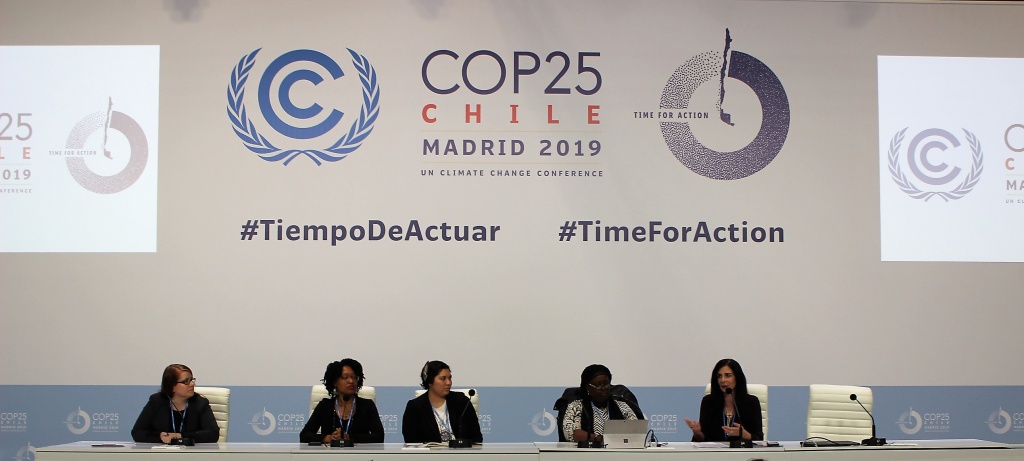FOR IMMEDIATE RELEASE
December 10th, 2019
At COP25, Women’s Rights and Climate Activists Advocate a Feminist Green New Deal
At the UN climate negotiations in Madrid, climate justice and women’s rights activists speak to collective feminist demands for Green New Deal policies, programs
Contact: Mara Dolan, Women’s Environment and Development Organization, mara@wedo.org, 217-550-8433
MADRID, SPAIN — In the midst of the global climate talks this week in Madrid, Spain, climate justice and women’s rights activists introduced a set of collective feminist demands to help advance the Green New Deal, in the US and around the world. At 12pm inside the talks, with an audience of both country delegates and civil society, a broad coalition of activists spoke to the need for feminist climate policy.
The activists represented a range of organizations working on climate, environmental, immigrant, racial, economic, and gender justice, and the coalition includes the Sierra Club, the Women’s Environment and Development Organization (WEDO), the NAACP, MADRE, the Women’s Earth and Climate Action Network (WECAN) and Grassroots Global Justice Alliance among others. The coalition’s campaign aims to ensure that gender and global justice, climate justice, and human and Indigenous rights are at the core of climate programs and policies at every level of governance.
The “Feminist Green New Deal Principles” launched earlier this summer during UN Climate Week call for Green New Deal policies and actions to “advance a transformative feminist agenda that centers the leadership of women, and acknowledges and addresses the generational impacts of colonization and anti-Black racism. It must end oppression against and be led and articulated by frontline, impacted communities – especially women of color, Black women, Indigenous women, people with disabilities, LGBTQIAP+ people, people from the Global South, migrant and refugee communities, and youth.” The 10 key principles call for advancing reproductive justice, the creation of regenerative economies centered on feminist analysis and understanding of the care economy, a shift from exploitative and unsustainable production patterns and a rejection of false solutions to the climate crisis.
Speakers at the event included Katherine Quaid of WECAN, Bridget Burns of WEDO, Dr. Jacqueline Patterson, Director of the NAACP Environmental and Climate Justice Program, and Dr. Frances Roberts-Gregory, an academic studying gender and the environment at the University of California, Berkeley, moderated by Osprey Orielle Lake of WECAN.
“80% of the biodiversity left on the Earth exists within Indigenous territories, primarily because of our relationship to nature, and so fighting to protect Indigenous sovereignty and rights is important to everyone’s future. In my community and in many Indigenous communities, women are the ones holding this knowledge and are vital to passing that onto future generations. Indigenous Women’s leadership must be centered if we want to save our planet.” said Katherine Quaid (Nez Perce/Cayuse/Paiute), WECAN Communications and Outreach Coordinator.
“When frontline women lead, we win. There are many examples of campaigns where feminist principles of organizing around systemic change were the key to success. To advance the true systems change we need, in the face of climate change, the Green New Deal must be rooted in feminist principles and practices. In the face of cancer clusters, asthma clusters, and violence against women as a result of the disproportionate placement of toxic facilities in communities of color and low-income communities, women of color are rising into leadership,” said Jaqui Patterson, Sr. Director, Environmental and Climate Justice Program NAACP.
“We have to situate ourselves and see that the personal is political, and the political is personal,” stated Frances Roberts-Gregory, an academic studying gender and the environment at the University of California, Berkeley. She added, “I conduct research with women of color on how they navigate relationships with energy and petrochemical industries, resist environmental racism, and imagine and advocate for energy and climate solutions. Often these groups are viewed as vulnerable, but they are resilient and they are change makers. They are the future we are looking for when we talk about climate justice.”
Bridget Burns, Director of WEDO, offered a final analysis with,“When we try to create climate action without gender justice, we fail. When we try to deliver climate action without racial justice, we fail. When we try to do this without the rights of Indigenous peoples, we fail. If we fail to understand the deep intersection between misogyny, white supremacy, rising right wing fascism, and climate denialism, we fail.”
In addition to presenting their collective demands, the event concluded with next stages of the Feminist Green New Deal coalition work, which includes growing in congressional influence, providing policy tools, and building popular support for the demands.

###
Link to website: www.feministgreennewdeal.com // #FemGND
Full Video:


